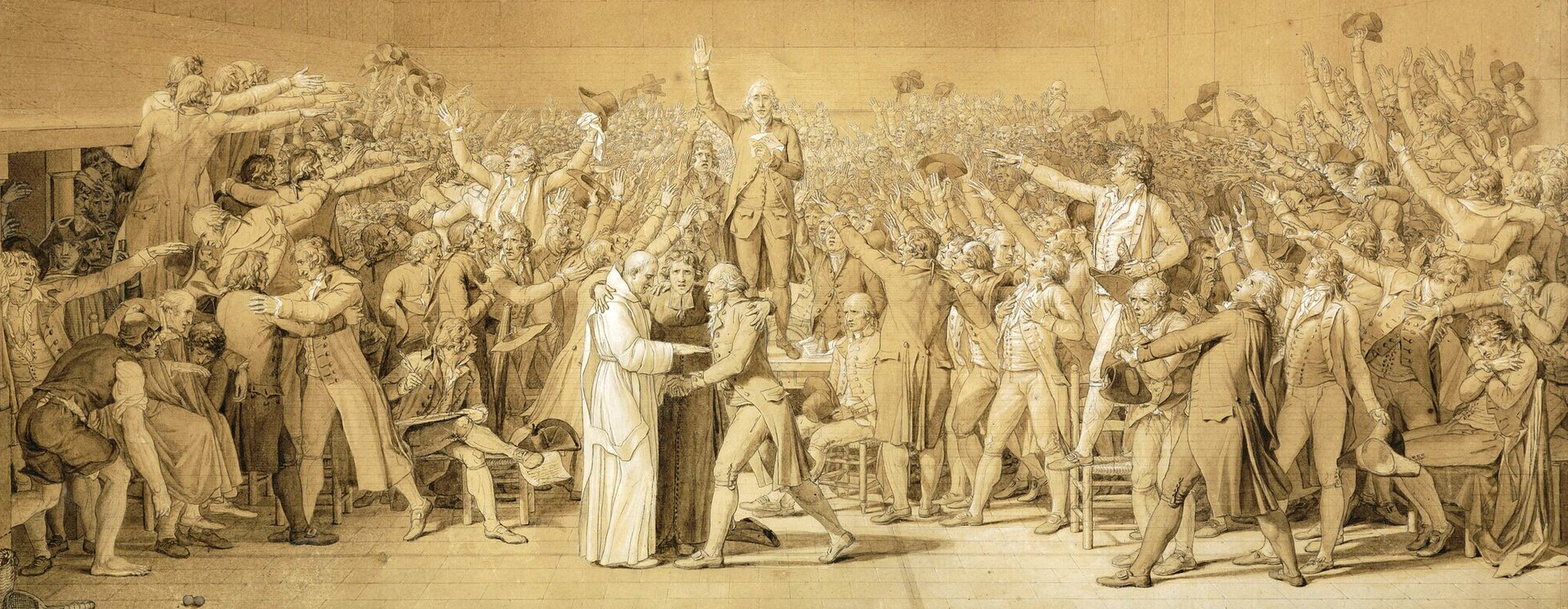Course Syllabus

SS 460 Modern Political Thought
Fall 2021
Dept. of Social Science and Cultural Studies
Pratt Institute
North Hall, room 111
Professor Roy Tsao
SYLLABUS
I. COURSE DESCRIPTION
This is an introductory/intermediate level course in political theory. Students from all Pratt programs are welcome, whatever their prior coursework or familiarity with the subject-matter. The course is also counted as an elective within the Philosophy minor.
In this course we read and discuss selections from major political thinkers of the modern era (from the Renaissance to the present day). Our thematic focus is twofold: the basis of, and limits to, legitimate political authority, and the political conditions for the realization of human freedom (variously conceived). Our historical span encompasses the rise and consolidation of the institution of the modern state in the sixteenth- and seventeenth-century Europe, the republican/democratic revolutions on both sides of the Atlantic in the late eighteenth century, and successive movements for broader human emancipation around the world in more recent times.
We begin with an introduction to the concepts of political power and authority, through consideration of the contrasting theoretical accounts offered in two key texts from the twentieth century : Max Weber’s lecture “Politics as a Vocation” (1919) and Hannah Arendt’s essay “On Violence” (1970). After this twentieth-century prologue, we go back to the sixteenth-century figure who is often counted the first truly ‘modern’ political thinker, Niccolò Machiavelli. Along with selections from Machiavelli’s Discourses on Livy (1531) and his celebrated, enigmatic handbook The Prince (1532), our survey of foundational theorists of modern political thought extends to Thomas Hobbes’s The Leviathan (1651) , Jean-Jacques Rousseau’s The Social Contract (1761), and The Federalist Papers of Alexander Hamilton and James Madison (1788). Nineteenth-century texts on our itinerary include Henry David Thoreau’s “Resistance to Civil Government” (1848) — the essay later known as “Civil Disobedience” — and The Communist Manifesto of Karl Marx and Friedrich Engels (1848). For more recent times, our geographic horizons widen to encompass Frantz Fanon’s The Wretched of the Earth (1961) - written in the heat of the Algerian movement, and resonating with anti-colonial liberation movements throughout the developing world — as well as anonymous writings from the more recent revolutionary neo-Zapatista movement in southeastern Mexico. We conclude with a contemporary thinker, Achille Mbembe, who offers reflections on contemporary global political predicaments from the standpoint of post-colonial Africa.
Our reading of primary works of political thought will be supplemented with consideration of landmark historical documents, including the U.S. Constitution, and the Declaration of the Declaration of the 1955 Asia-Africa Conference held in Bandung, Indonesia. We will also have occasion to consider the intersection of political thought and the visual arts and culture, through supplementary dossiers on topics ranging from Machiavelli's Florence to Zapatista political iconography.

The Oath of the Tennis-Court , 1789
(Detail from study for Jacques-Louis David's 1794 painting depicting the event)
II. COURSE ORGANIZATION & PROCEDURES
ORGANIZATION
The course will be conducted as an in-person lecture/seminar. Weekly sessions will be held at 2pm on Tuesdays through the term. Announcements, assignments, and other information will be disseminated electronically through Canvas.
 Brigade of women defending a barricade in the Paris Commune of 1871
Brigade of women defending a barricade in the Paris Commune of 1871
COURSE REQUIREMENTS
Attendance:
Regular attendance in the weekly sessions is required for all students. As inconsistent attendance is detrimental to the quality of the classroom experience for everyone, repeated absences will be penalized. Except in the case of medical emergencies, missing two consecutive sessions would be grounds for failing the course, as would be missing three sessions overall.
Seminar Participation and Presentations:
Students are expected to come to each session prepared to participate in discussion of the week’s reading assignment. In addition, students will be assigned, on a rotating basis, to make two or more informal presentations to the group. These presentations will typically take the form of a summary recapitulation of issues raised and discussed in the prior week's session, along with questions and issues for discussion in relation to the reading assignment for the week.
Written Work:
Written work for the course will take the form of three essays, on assigned topics. A first, short essay (1000-1250 words) is due on Friday, October 1. A midterm essay of 1500-1800 words is due on 11/5, and a final essay of the same length is due on Dec. 17. Unexcused late papers may be subject to penalty. (Please note that the each of the first two papers must be submitted within 3 weeks of their stated deadlines in order for a student to receive a minimally passing grade for the course.)

Liberian delegation at the Bandung Conference, 1955
GRADES
Course grades will be assessed on the following basis:
Attendance: 10%
General Participation & Presentations: 15%
First Essay (900-1200 words): 15%
Midterm Essay (1500-1800 words): 30%
Final Essay (1500-1800 words): 30%
TEXTS
All of the readings will be made available to students in digital form, either via Canvas or Pratt Library e-reserves. For students who would like to obtain their own printed copies of the books from which most of the assignments are taken, the following editions are recommended:
Arendt, Hannah. On Violence (Harcourt)
Fanon, Frantz. The Wretched of the Earth, trans. R. Philcox (Grove)
Hobbes, Thomas. The Leviathan, ed. A. Martinich (Broadview)
Machiavelli, Niccolò. The Prince, trans. H. Mansfield (Chicago)
Machiavelli, Niccolò. Discourses on Livy, trans. J. Bondanella (Oxford)
Marx, Karl & Engels, Friedrich. The Communist Manifesto (International)
Mbembe, Achille. Necropolitics (Duke)
Rousseau, Jean-Jacques. Discourse on Political Economy and The Social Contract, trans. C. Betts (Oxford)
OFFICE HOURS
Office hours will be held on Wednesdays from 4pm - 6pm, via Zoom. Please make an appointment using the Calendar feature on Canvas. In addition, I will usually be available to meet individually with students after class on Tuesdays. -RT

Detail from the original frontispiece of Hobbes's Leviathan (1651)
III. SCHEDULE OF ASSIGNMENTS:
8/31 [Introductory Session]
9/7 Max Weber, “Politics as a Vocation” (1919) [excerpts]*
Hannah Arendt, On Violence (1970): part II (pp. 35-56)*
*NOTE: The linked file for Weber's "Politics as a Vocation" contains only the assigned excerpts from this text (titled in this translation as "The Profession and Vocation of Politics"). The linked file for Arendt's On Violence contains the entire work; you are assigned to read only Part II, pp. 35-56.
9/14 Niccolò Machiavelli, Discourses on Livy (1531), Bk. I: Preface, chs. 1-7, 9-10, 16-18, 26-7, 29 46, 55, 58. Bk. II: Preface, chs. 1-2, 15.
☛ Dossier: Machiavelli & Florence [part 1: 1416-1512]
9/21 Machiavelli, The Prince (1532) [entire]
☛ Dossier: Machiavelli & Florence [part 2: 1512-1532]
9/28 Thomas Hobbes, Leviathan (1651): [Author’s] Intro.; Part II: chs.17-18; Part I: chs. 10-11, 13-16*
[*Note: the assigned chapters are deliberately given out of sequence; please read the assigned chapters in the order listed. After getting to the end, then go back and re-read chapters 17 and 18. ]
10/5 Hobbes, Leviathan: Part II: chs. 19-21, 26-30; Review & Conclusion
☛ Dossier: The Image of Leviathan: Iconography and Allusion in Hobbes's Original Frontispiece
• First Essay due on Friday, 10/8
[10/12: no class]
10/19 Jean-Jacques Rousseau, The Social Contract (1761): Bk I (entire); Bk. II, chs. 1-9;
Bk. III, chs. 1-2, 10-18; Bk. IV, chs. 1-2, 8.
10/26 U.S. Constitution: Preamble, Articles I-VI
☛ U.S. Constitution - lecture slides
Alexander Hamilton & James Madison, Federalist Papers (1787-8): nos. 10, 14, 15, 39, 47, 48, 51.
[NOTE: In the text of the U.S. Constitution provided on the website linked above, provisions that were superseded by subsequent amendments are printed in blue. In the excerpts given on the lecture slides, superseded provisions are printed in italics.]
11/2 Henry David Thoreau, “Resistance to Civil Government” (1848)
recommended: Frederick Douglass, “What to the Slave is the Fourth of July?” (1851);
Abraham Lincoln, “First Inaugural Address”(1861)
• Midterm Essay due on Friday 11/12
11/9 Karl Marx & Friedrich Engels, The Communist Manifesto (1848)
Engels, “The Principles of Communism” (1847)
11/16 Marx, "Wage-Labour & Capital" (1847)
Marx & Engels, "Address to the Central Committee of the Communist League" (1850)
11/23 Frantz Fanon, The Wretched of the Earth (1961): "On Violence," "Grandeur & Weakness of Spontaneity"
☛ Film: "The Battle of Algiers" [in class]
11/30 Fanon, The Wretched of the Earth: ch. 3 (1961): "The Trials and Tribulations of National Consciousness" (also review "On Violence" and "Grandeur & Weakness of Spontaneity"
12/7 Review Assignment:
• Machiavelli, Discourses, Bk. I, chs. 4, 5, 7, 12-18, 46, 55.
• Hobbes, Leviathan, chs. 17, 30
• Rousseau, Social Contract, Bk. III, chs. 10-15
• Fanon, Wretched of the Earth, pp. 133-144
• Final Essay due on Friday 12/17

Zapatista mural in Oventic, Mexico. Photo by Dane Strom.